牛津初中英语9A_Unit6知识点归纳
】牛津初中英语9A-Unit1--Unit6知识点归纳
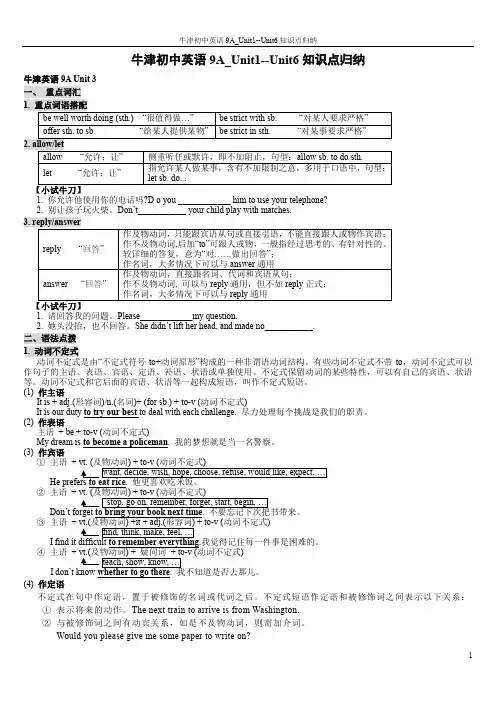
牛津初中英语9A_Unit1--Unit6知识点归纳牛津英语9A Unit 31. 你允许他使用你的电话吗?D o you ____________ him to use your telephone?1. 请回答我的问题。
Please____________my question.2. 她头没抬,也不回答。
She didn’t lift her h ead, and made no___________.二、语法点拨1. 动词不定式动词不定式是由“不定式符号to+动词原形”构成的一种非谓语动词结构。
有些动词不定式不带to,动词不定式可以作句子的主语、表语、宾语、定语、补语、状语或单独使用。
不定式保留动词的某些特性,可以有自己的宾语、状语等。
动词不定式和它后面的宾语、状语等一起构成短语,叫作不定式短语。
(1)作主语It is + adj.(形容词)/n.(名词)+ (for sb.) + to-v (动词不定式)It is our duty to try our best to deal with each challenge. 尽力处理每个挑战是我们的职责。
(2)作表语主语+ be + to-v (动词不定式)My dream is to become a policeman. 我的梦想就是当一名警察。
(3)作宾语①主语+ vt. (He prefers to eat rice.②主语+ vt. (Don’t forget to bring your book next time.③主语动词不定式)I find it difficult to remember everything.我觉得记住每一件事是困难的。
④主语动词不定式)I don’t know whether to go there.(4)作定语不定式在句中作定语,置于被修饰的名词或代词之后。
不定式短语作定语和被修饰词之间表示以下关系:①表示将来的动作。
牛津英语9A Unit 6
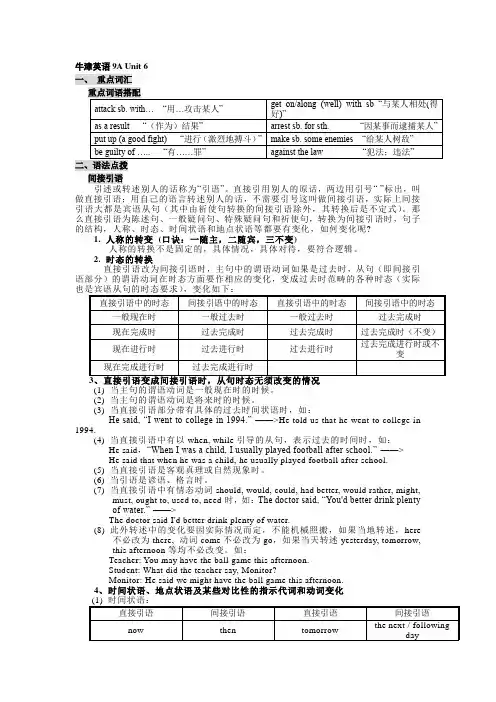
牛津英语9A Unit 6做直接引语;用自己的语言转述别人的话,不需要引号这叫做间接引语,实际上间接引语大都是宾语从句(其中由祈使句转换的间接引语除外,其转换后是不定式)。
那么直接引语为陈述句、一般疑问句、特殊疑问句和祈使句,转换为间接引语时,句子的结构,人称、时态、时间状语和地点状语等都要有变化,如何变化呢?1. 人称的转变(口诀:一随主,二随宾,三不变)人称的转换不是固定的,具体情况,具体对待,要符合逻辑。
2. 时态的转换直接引语改为间接引语时,主句中的谓语动词如果是过去时,从句(即间接引语部分)的谓语动词在时态方面要作相应的变化,变成过去时范畴的各种时态(实际(1) 当主句的谓语动词是一般现在时的时候。
(2) 当主句的谓语动词是将来时的时候。
(3) 当直接引语部分带有具体的过去时间状语时,如:He said, “I went to college in 1994.” ——>He told us that he went to college in 1994.(4) 当直接引语中有以when, while引导的从句,表示过去的时间时,如:He said,“When I was a child, I usually played football after school.” ——>He said that when he was a child, he usually played football after school.(5) 当直接引语是客观真理或自然现象时。
(6) 当引语是谚语、格言时。
(7) 当直接引语中有情态动词should, would, could, had better, would rather, might,must, ought to, used to, need时,如:The doctor said, “You'd better drink plentyof water.” ——>The doctor said I'd better drink plenty of water.(8) 此外转述中的变化要因实际情况而定,不能机械照搬,如果当地转述,here不必改为there, 动词come不必改为go,如果当天转述yesterday, tomorrow,this afternoon等均不必改变。
译林版牛津英语9A-Unit-6-知识点解析
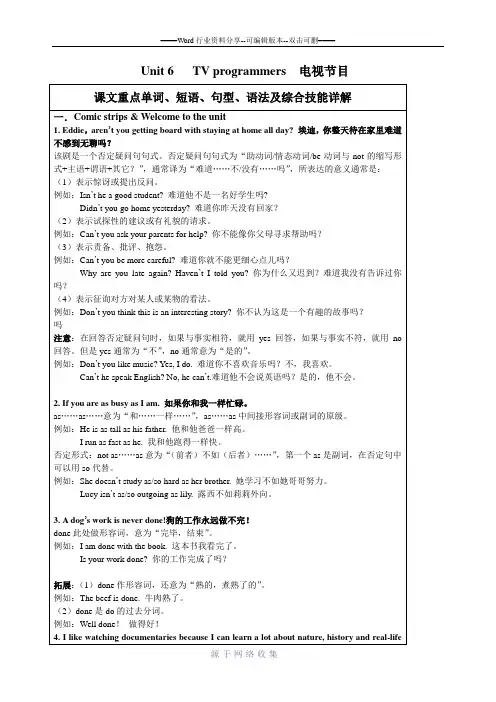
Unit 6 TV programmers 电视节目Unit 6 练习题Ⅰ.根据句意及首字母或汉语提示完成单词1. Congratulations(祝贺)to you on winning the first p________.2. Sports World c_________up-to-date sports news around the world at 10:00 pm.3. Students are getting ready for the c_______sports meeting.4. Feng Xiaogang is my favourite _________(导演).5. Waiting for him here is just a w________of time.Ⅱ. 用所给词的适当形式填空6. There are some children_______(swim) in the river.7. I saw some people_________(run) out of the supermarket when I walked past it.8. His parents will be worried if he__________(not come) back on time.9. Nobody can stop him from_________(try) out the new idea.10. The film__________(direct) by Li An is quite wonderful.Ⅲ.句型转换11. I watch TV three times a week.(对画线部分提问)________ you watch TV?12. She has joined the Art Club.(改为同义句)She is ___________ _________ the Art Club .13. Nothing is more important than life in the world, so we must prevent all the accidents like these .(改为被动语态)Nothing is more important than life in the world, so all the accidents like these _______ ______ ________.14. You shouldn’t arrive late for class.(改为祈使句)_______ for class.15. You can’t use my computer unless you get my permission.(改为同义句)You can’t use my computer _______ you_______ _________my permission?Ⅳ.根据汉语意思完成句子16.“难道你不认识他吗”“是的,我不认识”---________you know him?---_______, I________.17.篮子里装满了鸡蛋。
牛津9A Unit6 重要短语 句型 语法
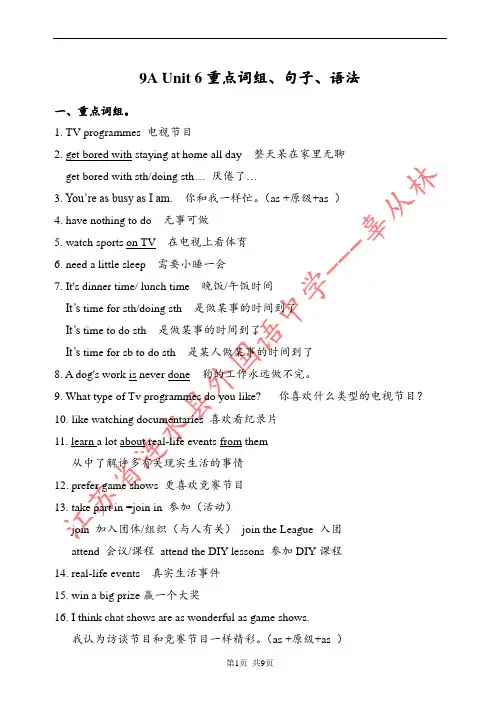
61. take an umbrella with you 随身带把伞 62. have little interest in sth 对….几乎没兴趣
have no interest in sth 对….没兴趣 63. time spent watching TV 用在看电视上的时间 64. most of them 它们中的大部分 65. be a waste of time 浪费时间 66. ask sb for help 向某人寻求帮助 67. call the police at once 立刻报警 68. three men in police uniforms 三个穿着警服的人
keep sb fom doing sth 阻止某人做某事 prevent sb (fom) doing sth 阻止某人做某事 73. write meaningful dialogues 写有意义的对话 mean—meaning—meaningful (adj) 有意义的 meaningless (adj) 无意义的
46. mind feeling scared 介意感到恐惧
mind doing sth 介意做某事
第3页 共9页
47. like films with good stories 喜欢有好故事的电影 48. the best TV programme for sb 适合某人的最好电视节目 49. have 时间看电视 50. complete all her homework quickly 迅速完成她全部的作业 51. find a programme interesting 发现一个节目有趣
牛津版9A chapter 6章节知识点
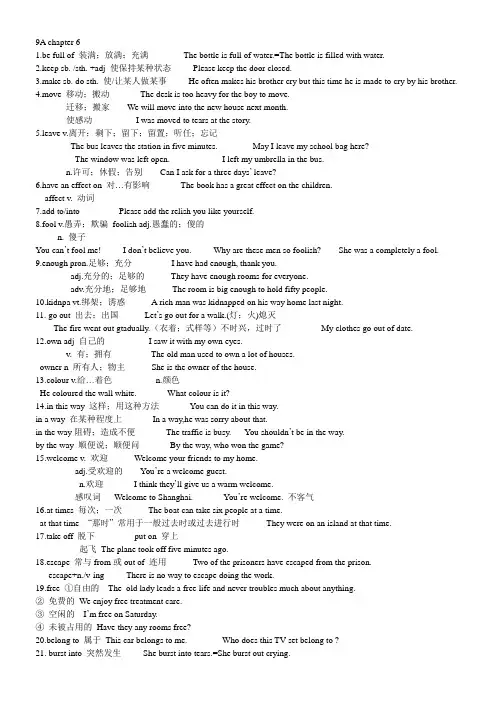
9A chapter 61.be full of 装满;放满;充满The bottle is full of water.=The bottle is filled with water.2.keep sb. /sth. +adj 使保持某种状态Please keep the door closed.3.make sb. do sth. 使/让某人做某事He often makes his brother cry but this time he is made to cry by his brother.4.move 移动;搬动The desk is too heavy for the boy to move.迁移;搬家We will move into the new house next month.使感动I was moved to tears at the story.5.leave v.离开;剩下;留下;留置;听任;忘记The bus leaves the station in five minutes. May I leave my school bag here?The window was left open. I left my umbrella in the bus.n.许可;休假;告别Can I ask for a three days’ leave?6.have an effect on 对…有影响The book has a great effect on the children.affect v. 动词7.add to/into Please add the relish you like yourself.8.fool v.愚弄;欺骗foolish adj.愚蠢的;傻的n. 傻子You can’t fool me! I don’t believe you. Why are these men so foolish? She was a completely a fool.9.enough pron.足够;充分I have had enough, thank you.adj.充分的;足够的They have enough rooms for everyone.adv.充分地;足够地The room is big enough to hold fifty people.10.kidnpa vt.绑架;诱惑 A rich man was kidnapped on his way home last night.11. go out 出去;出国Let’s go out for a walk.(灯;火)熄灭The fire went out gtadually.(衣着;式样等)不时兴,过时了My clothes go out of date.12.own adj 自己的I saw it with my own eyes.v. 有;拥有The old man used to own a lot of houses.owner n 所有人;物主She is the owner of the house.13.colour v.给…着色n.颜色He coloured the wall white. What colour is it?14.in this way 这样;用这种方法You can do it in this way.in a way 在某种程度上In a way,he was sorry about that.in the way阻碍;造成不便The traffic is busy. You shouldn’t be in the way.by the way 顺便说;顺便问By the way, who won the game?15.welcome v. 欢迎Welcome your friends to my home.adj.受欢迎的You’re a welcome guest.n.欢迎I think they’ll give us a warm welcome.感叹词Welcome to Shanghai. You’re welcome. 不客气16.at times 每次;一次The boat can take six people at a time.at that time “那时”常用于一般过去时或过去进行时They were on an island at that time.17.take off 脱下put on 穿上起飞The plane took off five minutes ago.18.escape 常与from或out of 连用Two of the prisoners have escaped from the prison.escape+n./v-ing There is no way to escape doing the work.19.free①自由的The old lady leads a free life and never troubles much about anything.②免费的We enjoy free treatment care.③空闲的I’m free on Saturday.④未被占用的Have they any rooms free?20.belong to 属于This car belongs to me. Who does this TV set belong to ?21. burst into 突然发生She burst into tears.=She burst out crying.burst out doing sth. 突然发生22.at the beginning of 在…之初Please read the text from beginning to end.He will go to England at the beginning of next month.23.on one’s own 独自地;主动地He did the work on his own.24.不可数名词数量时,常用“数词+单位名词+of +不可数名词”a piece of paper two pieces of paper a teaspoon of soup three teaspoons of soup25.take①拿;握住;抓住The mother took her child by the hand.②乘坐;搭(车,船)We took the bus to Beijing.③吃;喝;服用You must take the medicine three times a day.④花费(时间)需要;持续How long does the flight take?26.drop v. 落下;掉下The girl dropped the cup.drop by 请问;拜访He often drops by Tom’s .27.space 间隔;太空;空间He was the first man to walk in outer space.28.provide sb. with sth.=provide sth. for sb. 为某人提供某物Mr Smith provided food for us.=Mr Smith provided us with food.随堂测试1.—May I have another cake?—You’d better not. You shouldn’t go swimming on a________stomach.a.hotb.hungryc.fatd.full2.Look out! The cup is ______hot water.a.full ofb.fill withc.fulld.filled3.The earth is out home.We must______the land, air and water clean.a.getb.letc.keepd.take4.The heavy snowstorm made the mountain climbers_________halfway.a.stopb.to stopc.stoppingd.stopped5.Lin is going to________from Tai’an to Dalian after high school.a.startb.movec.setd.take6.After the earthquake, we heard of a lot of_________stories, and all of us were deeply _______.a.moving; movedb.moving;movingc.moved;movingd.moved;moved7.—Thanks for your wonderful dinner.I have to go now.—It’s raining hard. Don’t _______until it stops.a.arriveb.stayed.leave8.—Where is my handbag?—Maybe you have________it in the shoe shop.a.gotb.forgottenc.thrownd.left9.The boy read the article_______and found something important in it.a.careful enoughb.carefully enoughc.enough carefuld.enough carefully10.Look at the flowers! They are in different ________;red,yellow, pink….a.coloursb.sizesc.pricess11.—I want to go to different places,but I don’t know the _______.—A map is helpful,I think.a.priceb.wayc.timed.ticket12.—I’ve never had such a wonderful time.Thank you for asking me.—_________.a.Good jobb.That’s itc.That’s rightd.You’re welcome13.—__________has your uncle been to Canada?—Only twice.a.How many timesb.How oftenc.How longd.How soon14.The plane from Shanghai to Paris will ________in an hour.a.take upb.take awayc.take outd.take off15.Everyone knows that Taiwan belongs ________China.a.forb.toc.withd.about16.—I thought you had_________English.—No.It has been useful in my work.a.studiedb.droppedc.falledd.passed17.He_______us with the information that we needed.a.toldb.gavec.providedd.offered 答案:DACAA ADDBA BDADB BC。
牛津9Aunit6知识点词组句子归纳教学文案
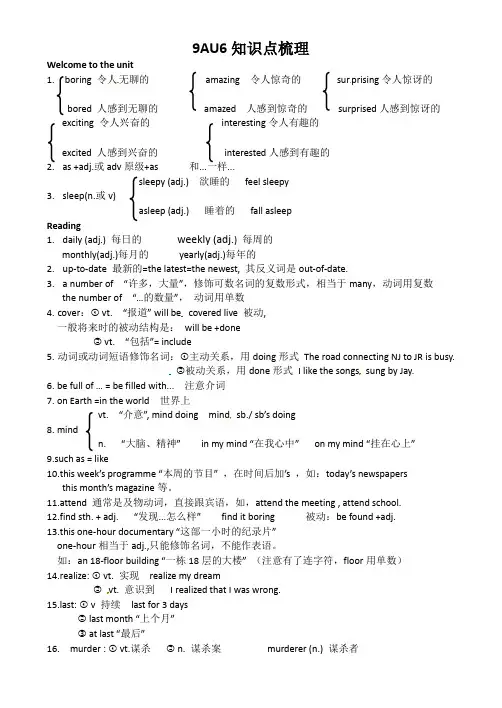
9AU6知识点梳理Welcome to the unit1. boring 令人无聊的amazing 令人惊奇的sur prising令人惊讶的bored 人感到无聊的amazed 人感到惊奇的surprised人感到惊讶的exciting 令人兴奋的interesting令人有趣的excited 人感到兴奋的interested人感到有趣的2.as +adj.或adv原级+as 和...一样...sleepy (adj.) 欲睡的feel sleepy3.sleep(n.或v)asleep (adj.) 睡着的fall asleepReading1.daily (adj.) 每日的weekly (adj.) 每周的monthly(adj.)每月的yearly(adj.)每年的2.up-to-date 最新的=the latest=the newest, 其反义词是out-of-date.3. a number of “许多,大量”,修饰可数名词的复数形式,相当于many,动词用复数the number of “…的数量”,动词用单数4.cover:①vt. “报道” will be covered live 被动,一般将来时的被动结构是:will be +done②vt. “包括”= include5.动词或动词短语修饰名词:①主动关系,用doing形式The road connecting NJ to JR is busy.②被动关系,用done形式I like the songs sung by Jay.6. be full of … = be filled with... 注意介词7. on Earth =in the world 世界上vt. “介意”, mind doing mind sb./ sb’s doing8. mindn. “大脑、精神” in my mind “在我心中” on my mind “挂在心上”9.such as = like10.this week’s programme “本周的节目” ,在时间后加’s ,如:today’s newspapersthis month’s magazine等。
牛津英语9A U6知识点 校对版
9A Unit 6 TV ProgrammesComic strip1. There are always famous people on these shows talking about their lives.1.there be +主语+doing sth有....在做某事There is a boy crying in the street. 有一个在街上哭的男孩。
拓展:1.there be+主语+过去分词有....被....There is a student called Jack in our class. 在我们班有一个叫杰克的学生。
2.there be+主语+不定式有...要做There are a lot of things to do today. 今天有许多事要做。
2.show n.表演,(广播或电视)节目,展览on show在展出What television shows do you usually watch? 你通常看什么电视节目?2. Eddie,aren’t you getting bored with staying at home all day?该句是一个否定疑问句句式。
否定疑问句的句式为“助动词/情态动词/be动词与not的缩写形式+主语+谓语+其他?”,通常意为“难道……不/没有……吗?”,所表示的意思通常有:(1)表示惊讶或提出反问。
如:Isn’t he a good student? 难道他不是一名好学生吗?(2)表示试探性建议或有礼貌的请求。
如:Can’t you ask your parents for help? 你不能向你父母寻求帮助吗?(3)表示责备、批评、抱怨。
如:Can’t you be more careful? 难道你就不能更细心点儿吗?Why are you late again? Haven’t I told you? 你为什么又迟到了? 难道我没有告诉过你吗? (4)表示征询对方对某人或某事的看法。
牛津初中英语9A_Unit1--Unit6知识点归纳(完整资料).doc
【最新整理,下载后即可编辑】牛津初中英语9A_Unit1--Unit6知识点归纳牛津英语9A Unit 11. 十二点钟了,可他还是睡不着。
It was twelve o’clock, but he was still __________.2. 别弄醒这个孩子,他才睡着。
Don’t ___________ the boy. He fell asleep just now.二、语法点拨1. It is + adj + of sb. + (not) to do sth.It’s +adj.+of sb. to do sth.句型在英语中运用较为频繁,尤其在口语中。
该句型通常表示说话人对客观事件的惊讶、兴奋、懊悔、难过等感叹情绪,其实相当于感叹句。
如:It’s very kind of you to help me. 你能帮助我,真是太好了!该句型与how 引导的感叹句可以互换,故上句可以改为:How kind it is of you to help me ! 或How kind of you to he lp me !在口语中, it is经常被省略, 再如:It’s nice of you to say so.你这样说,真是太好了!可以省略为Nice of you to say so.当然此句改为You’re nice to say so.也可,意思不变。
有时也可用简缩句型It’s + adj.+ of sb. 或That’s + adj. + of sb., 如:It’s wrong of you . 你错了!That’s lovely of her. 她多可爱呀!该句型中用作表语的形容词常见的有如下几类:(1) 表示聪明或愚蠢的形容词,有clever, wise, foolish, stupid, silly等,如:It’s silly of him to do such a thing. 他竟干出这样的事,真是愚蠢!(2) 表示正确或错误的形容词,有right, wrong, correct, incorrect 等,如:It was right of her not to come here. 她没有来这儿,太对了! (3) 表示好坏等品性的形容词,此类词较多,有good, nice, kind, swee t, friendly, lovely等, 如:It’s fri endly of you to come and see me. 你能来看我,真够朋友!(4) 表示褒义或贬义色彩的形容词,有brave, polite, careless, selfish等,如:It was brave of you to manage to do it. 你居然能做成这件事,真勇敢!【补充】of sb. 的句型通常都可转换为不定式作状语的句子。
牛津译林版英语九年级上册9A-UNIT6知识点总结
1. (1)be suitable for适合;This place is not suitable stu dents to visit.be suitable to do sth. “适合做某事”The weather is suitable go hiking./ hiking.He is the most suitable person be our monitor.2. enter the theatre = go/come into the theatren. entrance the entrance to+名词……的入口处The entrance to the hall is on your right.3.loss n. the loss of sth.某物的丢失the loss of sb.某人的逝世(1) The loss of his money worried him.(2) --What do you do with the loss of the library book? --I’ll pay for it.lose v. ( lost, lost) lost adj. 迷路的,丢失的Many wild animals are in danger because of their living areas .Many wild animals are in danger because of the of their living areas .All the people in the plane MH370 their lives in the accident.If he the book, he must pay for it .= If the book , he must pay for it .4.attention 注意sth. catch one’s attention 某物吸引了某人的注意力bring sb. to the attention of sb. / sth. 使…引起了…的注意Her sweet voice caught others’ attention.This brought him to the attention of the whole school.attractive adj. _________________charm n. 魅力charming adj. _______________ charmless adj.________________a woman of great charm = an attractive woman.= .5.insist vt. 坚持insist that+宾语从句宾语从句部分指的是说话人的建议,要求或事实。
牛津译林版初中英语9A Unit6 TV programmes 知识点总结
9A Unit6 TV programmes1.stay at home待在家里2.as busy as 和.....一样忙3.have nothing to do with与....无关4.up-to-date information = the latest information 最新信息5.drama series系列剧6.take a close look at近距离观看7.chat show访谈节目8.write down写下9.the coming World Cup即将到来的世界杯10.music video (=MV)音乐视频11.announce the results宣布结果12.text message短信,短消息13.send text messages发短信/短消息send text message to…发送短信至…send...to发送send out发送14.take part in参加15.polar bear北极熊16.one-hour 一小时的one hour 一小时17.take a close look at sth. 近距离观察18.find out查出;找到find out the answer 弄清楚/找出答案19.write down your answers写下你的答案20.be full of=be filled with充满…21.all day整天22.take … with sb. 随身带......23.have nothing to do 无事可做24.too much dialogue 太多对话25.in the wild在野外的环境中26.game show游戏表演,竞赛节目27.hundreds of 数以百计的,成百上千的hundred 与具体数字连用时,不可以用复数形式,但其后的名词用复数形式three hundred students28.be in danger处于危险中29.die of死于.....30.be interested in对...感兴趣31.win a big prize 赢得一个大奖32.be different from 与......不同33. a waste of time浪费时间34.feel sad about为...感到难过35.get bored with sth. 对某事感到无聊36.need a little sleep需要小睡一会37.real-life events真实生活事件38.win two free concert tickets赢得两张免费音乐会票39. a weekly round-up每周摘要40. a report on…一个关于…的报告41.cover 涉及、包括、报道、电视报道cover sth. live现场直播(be covered live被现场直播)42.be covered live被现场直播43.vote online for sb.在线为某人投票44. a film directed by…由…导演的电影directed by…由......导演a new director 一个新导演45. a wealthy doctor一位有钱的医生46.solve mysteries 破解悬疑47.get scared easily容易害怕48.stop hunting them停止捕杀他们49.win an award for…因…而获奖50.find this book interesting发觉这本书有趣(find+n.+adj.)51.introduce sth./sb. to sb.向某人介绍某物/某人52.live a family像一个家庭一样生活53.catch fish from the water从水里抓鱼54.have a chance to do sth. 有机会做某事55.have little interest in…对…几乎没兴趣 viewing habits看电视习惯57.cry for help 尖叫求助寻求帮助ask for help58.be different from each other彼此不同59.pass away 去世= die60.receive a message from…收到来自…的消息61.call the police at once立刻报警62.dead adj.死的die vi.死,死亡(瞬间动词)→(延续性的状态be dead)death n.死,死亡63.three men in police uniform穿警察制服的三名男子64.push sb. into…把某人推进…(被动:be pushed into…)65. a tour guide导游66. a number of 许多, 后面跟可数名词的复数形式,谓语动词是单数。
- 1、下载文档前请自行甄别文档内容的完整性,平台不提供额外的编辑、内容补充、找答案等附加服务。
- 2、"仅部分预览"的文档,不可在线预览部分如存在完整性等问题,可反馈申请退款(可完整预览的文档不适用该条件!)。
- 3、如文档侵犯您的权益,请联系客服反馈,我们会尽快为您处理(人工客服工作时间:9:00-18:30)。
牛津初中英语9A Unit6短语归纳1.(1)be/get dressed in+ 颜色/衣服=wear = be in穿着……衣服(强调状态)(2)dress up盛装, 打扮, 装饰, 伪装/多么重要的工作!因谋杀被通缉某人的电话(找某人接电话)看见某人正在做(2)at the time of the crime在犯罪时间一条证据扑灭(3) put off 延期(4) put down 放下(5) put away把…收起来,整理(6) put on 穿上、上演(8)put one’s effort into把精力投入到检查现场指纹…..犯有……罪与某人交朋友(通常用现在完成时)…(2)prove (sb) to be…证明是……提拱…(钱)的奖赏导致凶手的被捕看到任何不寻常的事做些违反法律的事言行反对某人发生,举行第二天呼出,发送出(情态动词)42.(1) dare to go out alone at night 敢独自一个人夜里出去时间快用完了(2)take/have a shower/bath 洗澡notice sb do /doing sth(经常/正在)排队等候35岁时30几岁时(复数)熟悉有/没有犯罪记录因盗窃入狱六个月还(包含)(2)make a living 谋生65.(1)…而震惊(2)live next door住在隔壁因某事而逮捕某人(主动因为某事而被逮捕(被动)举行写作竞赛(外貌或性格)回答:? 她喜欢什么?She likes apples/cartoons.替某人致谢语法:直接引语和间接引语当我们引用别人的话时,可以用别人的原话,也可以用自己的话把意思转述出来,如果是引用原话,被引用的部分就称为直接引语,如果是转述,就称为间接引语。
如:A. The detective asked: “Who knows the victim?”,其中的“Who knows the victim?”就是直接引语。
B. The detective asked who knew the victim. 其中的who knew the victim就是间接引语。
直接引语通常用引号(“”)括起来,间接引语在多数情况下都构成一个宾语从句。
★如果引用的句子原来是一个陈述句,在间接引语的开头用连词that;要根据意思改变人称,同时引语中的谓语和主句的谓语在时态上要相对称。
①He said, “the woman looks very worried.”→ He said that the woman looked very worried.★分析:①两句中的间接引语开头用连词that,在动词say后,有时that可以省略。
② Tom said to me, “I have left my toy at home.”→Tom told me that he had left his toy at home.★分析:②两句中直接引语和间接引语的主语已经发生变化。
间接引语中的主语和主句中的主语是一致的。
he就是指Tom,she就是指The victim’s mother.③“I’m scared”, said the witness.→The witness said that she was scared.★分析:③两句中的直接引语是一般现在时,变成间接引语时,要变成一般过去时。
④“The thief is running away.” Said Mrs Ma.→★★★Mrs Ma said the thief was running away.★分析:④两句中,直接引语中的现在进行时改变成了间接引语中的过去进行时,表示在过去某时,动作正在进行。
⑤Detective Lu said, “I’ve finished my report.”→Detective Lu said that he had finished his report. ★分析:⑤两句中,直接引语中的现在完成时,改变成了间接引语中的过去完成时。
⑥Mr Wu said, “I read the newspaper.”→Mr Wu said that he had read the newspaper.★分析:⑥两句中,直接引语中的一般过去时改变了间接引语中的过去完成时。
直接引语中的动作read,saw发生在主句动作said之前,因此变成间接引语时要变成过去完成时。
⑦“We will look for more clues.” Said Detective Jones.Detective Jones said that they would look for more clues.★分析:⑦两句中直接引语中的一般将来时,改变成了间接引语中的过去将来时,表示look for和catch up with这两个动作分别发生在主句动作“said和answered”之后,因此间接引语中要用过去将来时。
★直接引语变成间接引语时,直接引语中的指示代词,地点和时间状语等要作相应的变动。
①She said: “I will come here tonight.”—She said that she would go there that night.②Jack said to us, “These are my stamps.”—Jack told us that those were his stamps.③Lucy said: “My sister came back two days ago.”Lucy said that he sister had gone back two days before.④Mr Hu answered, “They will arrive here tomorrow evening.”Mr Hu answered that they would arrive there the next evening.指示代词: this------- thatthese -----those地点状语:here ------there动词: come -----go时间状语:now -------thentoday -----that dayyesterday ------the day beforelast week(year, ect.) -----the week(year, ect.) beforetwo days(a month, ect.) ------two days(a month, ect.) beforetomorrow ---------the next(following) daytomorrow morning-------- the next(following) morningnext week(year, ect.) ----------the next week(year, ect.)【注】时间状语this afternoon在间接引语中没有改变。
因为转述的是当天所说的话。
这种情况下,时间状语可不作改变。
如:⑥Tom said: “I will finish the work this afternoon.”Tom said that he would finish the work this afternoon.★如果直接引语是一个特殊疑问句,在变成间接引语时,除了要注意人称,状语等的变化和时态相对称外,还要注意间接引语中应用陈述句的语序,不能用疑问句的语序。
同时不能用连词that,而要用特殊疑问句,句末用句号。
①The teacher asked, “What are you parents?”The teacher asked what my parents were.②He asked, “When will you see your uncle, Liu Mei?”He asked Liu Mei when she would see her uncle.③I asked, “Which book is yours, Meimei?”I asked Meimei which book was hers.④Tom asked me, “How are you getting on with your classmates?”Tom asked me how I was getting on with my classmates.⑤I asked, “Who did you wait for yesterday, Tom?”I asked Tom who he had waited for the day before.⑥She asked, “Where are we going to meet tomorrow?”She asked where they were going to meet the following day.⑦He asked me, “Why were you late yesterday?”He asked me why I had been late the day before.★如果直接引语是一般疑问,选择问句或反意疑问句,在间接引语前要用连词whether或if。
①He asked, “Are you sure your mother will come?”He asked if (whether) I was sure my mother would come.②She asked, “Are you a student or a teacher?”She asked me whether I was a student or a teacher.【注】当引用的一个反意疑问句时,连词只能用whether。
③He asked, “you have a few friends in the new school, don’t you?”He asked me whether(if) I had a few friends in the new school.★当直接引语是一个祈使句时,我们通常用一个含有复合宾语的简单句,把这个请求或命令表示出来,而不用复合句。
①He said, “Please come her e earlier.”-----He asked me to go there earlier.②The teacher said, “Don’t do that again, children.”----The teacher told children not to do that again.③The captain said, “Get everything ready in two hours.”The captain ordered (told) us to get everything ready in two hours.【注】在此用祈使句时,谓语动词可根据句子的口气来决定。
